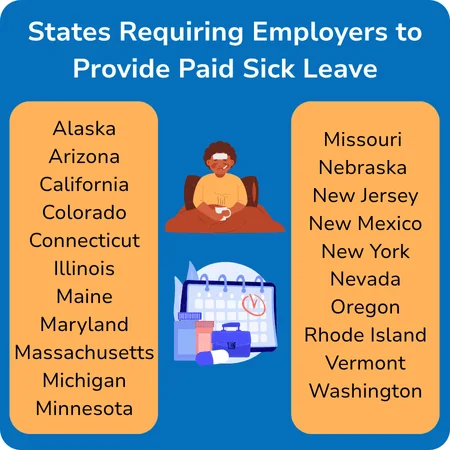You may get paid time off due to disability if your employer offers sick leave or short-term disability insurance, or if you live in a state with a paid leave program.
If you need to miss work because you're sick or injured, you might be able to collect disability payments to help tide you over while you recover. Depending on where the illness or injury occurred, what company you work for, and what state you live in, you may have several options for getting short-term disability benefits.
Short-term disability insurance can pay out a certain percentage of your usual earnings if you become unable to work for a limited period of time. It may be employer-provided or, in a few cases, state-provided. (All states, however, require employers to provide workers' compensation coverage in the event you become injured or sick on the job.) Before you take time off for health reasons, it's important to know what benefits are available to you and how long they last.
Do Employers Have to Offer Short-Term Disability Benefits?
In most states, no. Employers can choose to provide short-term disability insurance as a benefit for their employees, but it isn't required. However, the following states do have laws providing for short-term or temporary disability insurance programs:
For employees in all other states, you should check to see if your employer may have purchased a policy voluntarily. Policies that employers can purchase are generally governed by the Employment Retirement Income Security Act (ERISA). You can also purchase your own short-term disability insurance plan as an employee or if you're self-employed.
Do You Get Paid on Short-Term Disability?
Only if you're covered by a private short-term disability insurance plan (whether individually purchased or offered as a perk by your employer) or you live in a state that offers temporary disability benefits. If you don't have coverage through insurance or a state government program, any leave you take will be unpaid. However, you could be entitled to job protection when you take time off for an illness or injury—meaning that your employer has to hold your job for you to come back to.
Benefits from private short-term disability insurance plans are paid through policies purchased by employers. Government short-term disability benefits are paid through state programs. The state programs are usually funded by employer or employee taxes, or a combination of the two, but each state's program varies.
How Much Can I Get from Short-Term Disability?
Short-term disability benefits pay a portion (usually 40%-70%) of your wages if you become temporarily unable to work due to illness, injury, surgery, or pregnancy. These benefits generally cover only medical conditions that occur off the clock—job-related injuries are covered under workers' compensation.
Regardless of how you're covered, these plans follow the same general framework. You're entitled to receive a percentage of your regular salary for a set period of time, commonly three to six months. Many plans have an initial waiting period—seven days is typical—during which you aren't paid benefits. The exact claims process, amount you will receive, duration of benefits, and other details are all determined either by state law or by the terms of your individual plan.
Do Employers Have to Offer Sick Leave?
Paid sick leave laws require employers to provide regular wages for employees who need to take a few days off for a routine illness, preventative medical care, or attending to a sick family member. While there's no federal law mandating that employers provide paid sick leave, almost half of all states require employers to offer paid sick leave. Additionally, some cities have their own rules for when companies must provide sick leave, even if they're not in a state that does.

Employers in states that aren't required to offer paid sick leave often provide it anyway as a job benefit. If your employer is one of them, you can get paid for your time off, but you'll need to follow the program's procedures. For example, if employees are required to give notice if they're taking sick leave for a foreseeable purpose (such as childbirth or a planned surgery), you'll need to provide notice. Likewise, if your employer doesn't "advance" sick leave to employees, you can only take as much time off as you've already banked. While you may be entitled to unpaid family and medical leave, you can use your employer's paid sick leave plan only if you meet the requirements of that plan.
Can You Collect Short-Term Disability at the Same Time as Vacation or Sick Pay?
In some states, you can collect both short-term disability benefits (or paid leave) and sick pay at the same time. But you generally aren't allowed to "double-dip," although the rules vary by state. Instead, you collect a certain percentage of your salary—often 60%—from the state program, and you can make up the difference with your sick time, vacation time, or PTO (paid time off) if you've accrued enough of it. Because each state's rules are different, you should visit your state's employment development department for information tailored to your situation.
What Else Should I Know About Employer-Paid Short-Term Disability Benefits?
When you're recovering from an illness or injury, your primary focus should be on getting better, not wrangling with an insurance company. You may find the following articles useful in making sure that the disability claims process goes as smoothly as possible:
- What Qualifies for Short-Term Disability?
- Preparing and Filing Your Short-Term Disability Claim
- Appealing a Denied Short-Term Disability Claim
It's unlikely that you'll need legal representation just to file the insurance paperwork, but if you're struggling to get your claim approved, you may want to consult an experienced attorney, especially if you're going to be out of work for an extended period of time—in which case you may qualify for Social Security disability benefits. Most disability lawyers offer free consultations, so it doesn't hurt to ask around and find one who's a good fit for you.
